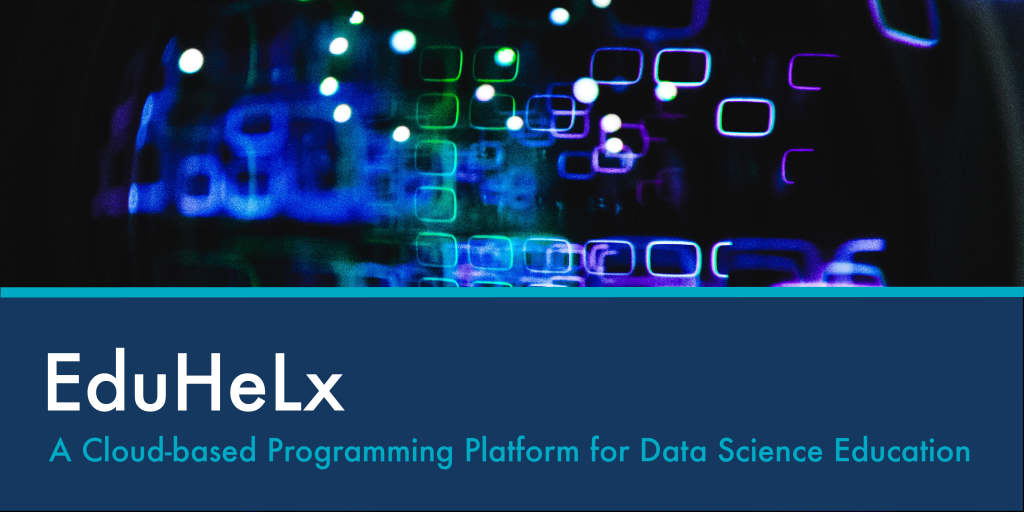The EduHeLx pilot experiment informed future thinking about incorporating cloud-based technologies in UNC-CH courses, including courses in the new UNC-CH School of Data Science & Society (SDSS)

EduHeLx is an education-focused instance of HeLx, a scalable cloud-based computing platform developed by researchers at the Renaissance Computing Institute (RENCI), a data science research institute at UNC-Chapel Hill. HeLx offers a suite of tools, capabilities, and workspaces enabling research communities to deploy custom data science workspaces securely in the cloud.
EduHeLx was developed to address the needs of courses with programming components and currently supports programming using Python and R. Previously, students were required to download a course’s programming software onto their own computers, and instructors had to work one-on-one with students to troubleshoot issues throughout the semester; this was so time-consuming that it took away from teaching time and derailed course schedules, especially in computer science courses with 250+ students. With EduHeLx, infrastructure setup is not required by instructors or students–students can access a course’s programming software in the cloud without the need to download it, thus saving a significant amount of class time.
Emphasizing EduHeLx’s benefits, Ashok Krishnamurthy, Interim Director at RENCI and professor of Computer Science at UNC-Chapel Hill, stated, “We could concentrate on the instructional material for the course rather than spending time debugging installations on student’s laptops or other technology problems that unexpectedly crop up during the semester.” Additionally, EduHeLx allows instructors to send all course material through the platform, as well as enable auto-grading for exams and assignments, another time-saving capability that was not previously possible.
As a pilot experiment, UNC Information & Technology Services (ITS) assisted RENCI in applying EduHeLx as the educational platform in the UNC-Chapel Hill Computer Science course, COMP 116: Introduction to Scientific Programming, in Fall 2021 (Stan Ahalt/Ashok Krishnamurthy) and Spring 2022 (John Majikes). ITS provided technical support to deploy EduHeLx on UNC’s Google Cloud and assisted with adding 250+ student accounts; further, ITS provided financial support for the cloud costs to deploy EduHeLx and helped ensure security of the platform. RENCI and ITS both learned a great deal from this experiment, and it aided in informing ITS’ future engagement with cloud-based learning solutions.
ITS, which manages the University’s Google Cloud Platform (GCP) environment, set up monitoring and essential guardrails to protect University data and advised RENCI on best practices for efficiently managing the resources, said Chuck Crews, Manager of ITS Cloud Operations Group, and John Godehn, ITS Systems Programmer/Specialist.
“One of the compelling reasons to deploy in the cloud is that you only pay for what you’re using,” instead of paying for resources to sit idle, Crews said. Working in the cloud allows for resources to be deployed, and undeployed, as needed.
Given the innovative capabilities EduHeLx enables for data science education, the newly launched UNC-Chapel Hill School of Data Science & Society (SDSS) is considering making extensive use of EduHeLx for a range of courses. Dr. Stan Ahalt, Inaugural Dean of the SDSS, reported that the School hopes to use the platform as a mechanism to provide data and computation to students very early in the program, both in existing courses cross-listed with other departments and in new courses developed by the SDSS. Further elaborating on the novel utility of EduHeLx, Ahalt stated, “The ability to stand up an educational platform and reliably provision the data and computation through a relatively simple process will enable us to engage new students seamlessly, as well as provide a tool that will grow with them as they progress in their coursework and research.”
One of the main focuses of the SDSS is preparing students for an evolving workforce that increasingly demands data science literacy, which necessitates an interdisciplinary approach to integrate data science programming into a wide range of courses, including courses in the humanities and social sciences. Additionally, the SDSS places significant emphasis on their last ‘s’–society; by introducing data science and its applications to students with diverse disciplinary interests, the SDSS can better prepare them to effectively apply data science in their career of choice and maximize their impact on society. With its unique, accessible, and adaptable capabilities, EduHeLx has the potential to serve as a key resource to transform the SDSS’ vision into reality.


